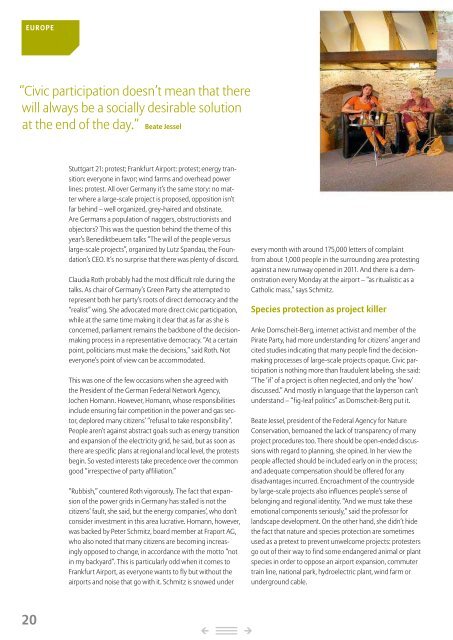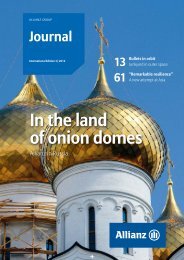Journal - Allianz
Journal - Allianz
Journal - Allianz
Create successful ePaper yourself
Turn your PDF publications into a flip-book with our unique Google optimized e-Paper software.
EUROPE<br />
Darchinger<br />
<strong>Allianz</strong> Group <strong>Journal</strong> 2/2013<br />
“Civic participation doesn’t mean that there<br />
will always be a socially desirable solution<br />
at the end of the day.” Beate Jessel<br />
danger that people will have a knee-jerk reaction to any<br />
given project,” added Jochen Homann from the Federal<br />
Network Agency. And he should know.<br />
Stuttgart 21: protest; Frankfurt Airport: protest; energy transition:<br />
everyone in favor; wind farms and overhead power<br />
lines: protest. All over Germany it’s the same story: no matter<br />
where a large-scale project is proposed, opposition isn’t<br />
far behind – well organized, grey-haired and obstinate.<br />
Are Germans a population of naggers, obstructionists and<br />
objectors? This was the question behind the theme of this<br />
year’s Benediktbeuern talks “The will of the people versus<br />
large-scale projects”, organized by Lutz Spandau, the Foundation’s<br />
CEO. It’s no surprise that there was plenty of discord.<br />
Claudia Roth probably had the most difficult role during the<br />
talks. As chair of Germany’s Green Party she attempted to<br />
represent both her party’s roots of direct democracy and the<br />
“realist” wing. She advocated more direct civic participation,<br />
while at the same time making it clear that as far as she is<br />
concerned, parliament remains the backbone of the decisionmaking<br />
process in a representative democracy. “At a certain<br />
point, politicians must make the decisions,” said Roth. Not<br />
everyone’s point of view can be accommodated.<br />
This was one of the few occasions when she agreed with<br />
the President of the German Federal Network Agency,<br />
Jochen Homann. However, Homann, whose responsibilities<br />
include ensuring fair competition in the power and gas sector,<br />
deplored many citizens’ “refusal to take responsibility”.<br />
People aren’t against abstract goals such as energy transition<br />
and expansion of the electricity grid, he said, but as soon as<br />
there are specific plans at regional and local level, the protests<br />
begin. So vested interests take precedence over the common<br />
good “irrespective of party affiliation.”<br />
“Rubbish,” countered Roth vigorously. The fact that expansion<br />
of the power grids in Germany has stalled is not the<br />
citizens’ fault, she said, but the energy companies’, who don’t<br />
consider investment in this area lucrative. Homann, however,<br />
was backed by Peter Schmitz, board member at Fraport AG,<br />
who also noted that many citizens are becoming increasingly<br />
opposed to change, in accordance with the motto “not<br />
in my backyard”. This is particularly odd when it comes to<br />
Frankfurt Airport, as everyone wants to fly but without the<br />
airports and noise that go with it. Schmitz is snowed under<br />
every month with around 175,000 letters of complaint<br />
from about 1,000 people in the surrounding area protesting<br />
against a new runway opened in 2011. And there is a demonstration<br />
every Monday at the airport – “as ritualistic as a<br />
Catholic mass,” says Schmitz.<br />
Species protection as project killer<br />
Anke Domscheit-Berg, internet activist and member of the<br />
Pirate Party, had more understanding for citizens’ anger and<br />
cited studies indicating that many people find the decisionmaking<br />
processes of large-scale projects opaque. Civic participation<br />
is nothing more than fraudulent labeling, she said:<br />
“The ‘if’ of a project is often neglected, and only the ‘how’<br />
discussed.” And mostly in language that the layperson can’t<br />
understand – “fig-leaf politics” as Domscheit-Berg put it.<br />
Beate Jessel, president of the Federal Agency for Nature<br />
Conservation, bemoaned the lack of transparency of many<br />
project procedures too. There should be open-ended discussions<br />
with regard to planning, she opined. In her view the<br />
people affected should be included early on in the process;<br />
and adequate compensation should be offered for any<br />
disadvantages incurred. Encroachment of the countryside<br />
by large-scale projects also influences people’s sense of<br />
belonging and regional identity. “And we must take these<br />
emotional components seriously,” said the professor for<br />
landscape development. On the other hand, she didn’t hide<br />
the fact that nature and species protection are sometimes<br />
used as a pretext to prevent unwelcome projects: protesters<br />
go out of their way to find some endangered animal or plant<br />
species in order to oppose an airport expansion, commuter<br />
train line, national park, hydroelectric plant, wind farm or<br />
underground cable.<br />
(From left) Anke Domscheit-Berg, Claudia Roth, Lutz Spandau, Beate Jessel,<br />
Peter Schmitz and Jochen Homann at the Benediktbeuern talks<br />
Progressive aging of the population will only make people<br />
more intransigent, said Peter Schmitz from Fraport.<br />
Demographic trends go hand in hand with a decrease in a<br />
willingness to change, he noted. The well-off “Wutbürger”<br />
(enraged citizen) isn’t thinking about his grandchildren’s<br />
generation or the country’s future. “I’m not very optimistic,”<br />
said Schmitz. “We’re becoming very inflexible.”<br />
Anke Domscheit-Berg, on the other hand, has witnessed a<br />
movement developing especially in the digital world that<br />
doesn’t reject or obstruct but gets involved, seeks an active<br />
part and isn’t frightened off by red tape. The influence of<br />
the internet community was evident in 2012 in the anti-ACTA<br />
movement, which Domscheit-Berg believes prevented a<br />
censorship infrastructure on the internet. In Hamburg, civil<br />
society groups initiated a transparency law, obliging the<br />
authorities to make all its data accessible on the internet –<br />
the first of its kind in Germany.<br />
“Of course civic participation doesn’t mean that there will<br />
always be a socially desirable solution at the end of the day,”<br />
Beate Jessel cautioned, before anyone got too excited. In<br />
the federal state of Baden-Württemberg, for instance, the<br />
coalition government of Greens and Social Democrats is at<br />
loggerheads with the electorate, which is firmly against a<br />
national park in the northern Black Forest. In North Rhine<br />
Westphalia the will of the people has already prevented<br />
the establishment of a national park. “There’s a substantial<br />
Sometimes opposition produces strange results: while the<br />
citizen’s army in one region is against underground electric<br />
cables, the people in another region are vehemently in favor<br />
of it to put a stop to high voltage above ground power lines.<br />
“You sometimes get the impression that protests have<br />
become the business model of assessors and lawyers,” said<br />
Homann. Politicians haven’t been any real use to him in these<br />
disputes. The greatest risk to energy transition is the disagreement<br />
between the federal states about the future of<br />
energy supply, he cautioned. “Sixteen different opinions<br />
add up to a load of nonsense in the end. We suffer under<br />
federalism when it comes to this issue.”<br />
The guilty party<br />
Claudia Roth, who could hardly contain her anger during<br />
Homann’s statement, accused the government of being the<br />
guilty party in the energy transition debacle. It’s unacceptable<br />
that the Environment Ministry and Ministry of Economics<br />
are at odds with each other in this matter, said the Green<br />
politician: “We need coherence. It should have top priority in<br />
the Chancellery.” Peter Schmitz concurred. “Politicians must<br />
put forward a clear policy,” he said.<br />
In the controversial prestige project Stuttgart 21, Roth’s party<br />
has just had the painful experience that a clear policy isn’t<br />
always enough. Although the Greens were emphatically<br />
against the railway project, a majority in the 2011 referendum<br />
voted against withdrawal of the federal state. The regional<br />
government led by the Greens now has to implement the<br />
development plan. “We crashed and burned,” admits Roth.<br />
But she was in no doubt that direct civic participation is indispensable<br />
for a living democracy. “Even if it hurts sometimes.”<br />
HTTPS://UMWELTSTIFTUNG.ALLIANZ.DE<br />
“You sometimes get the impression that protests have become<br />
the business model of assessors and lawyers.” Jochen Homann<br />
20<br />
<br />
<br />
<br />
<br />
21










